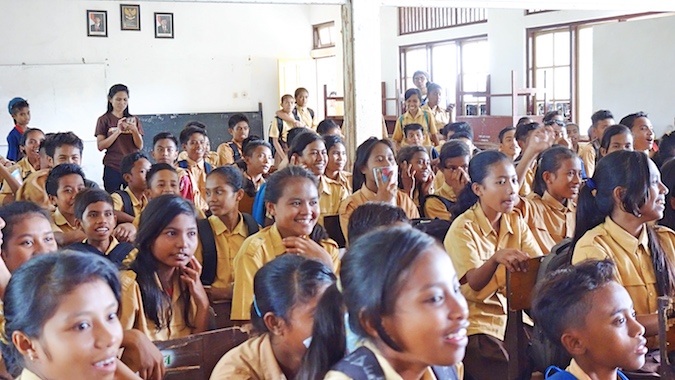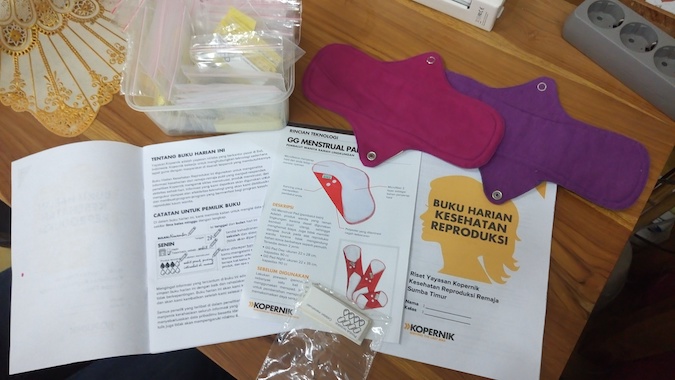Adolescence is arguably one of the most difficult times in life. Many teenagers, especially in some of the more remote parts of Indonesia, lack the necessary information about sexual and reproductive health to avoid problems such as unwanted teenage pregnancy, poor menstrual hygiene management, and sexually transmitted diseases. These issues affect young females especially, often reducing their ability to attend school consistently or even graduate. To safely navigate through these years, young people must be equipped with sufficient education about their own health and bodies.
Menstrual hygiene management is a challenge in international development. Researchers and policymakers have suggested that menstruation may cause girls to miss a significant number of school days. In rural Indonesia, 17 percent of 512 surveyed students missed at least 1 day in the last period due to difficulties related to menstrual health management (Burnet Institute, 2015). Furthermore, 28% of students who attributed their absence to menstrual management said that the use of, beliefs associated with, and access to menstrual products was the main cause. While disposable sanitary pads are available for purchase in the last mile, these eco-destructive products are often expensive and therefore unattainable for many low-income women and girls.
However, some have suggested that access to affordable and reusable sanitary pads, made from environmentally friendly materials, could be a good solution to these challenges (Annabel Buzink, SIMAVI, 2015). In alignment with this thinking and our focus on finding what really works to reduce the impact of poverty, we initiated a project late last year to explore how a hygienic and reusable sanitary pad — the GG Pad — could assist women and girls.
What is so good about this product? This pad does not contain harmful chemicals. It therefore assists in reducing the subsequent adverse effects on female reproductive organs. Moreover, it boasts cost-effectiveness when used over a period of time, and can assist in reducing waste by replacing single-use sanitary napkins, either completely or partially.

cross a 100-day research period, we tested this menstrual hygiene solution with a group of 80 female students at a middle school in East Sumba, Indonesia. We were interested to see whether access to these pads could reduce the number of school days missed as a consequence of menstrual hygiene management challenges.
Through a contained project timeline and sample size, we hope to find what works and what doesn’t faster. This rapid testing approach allows the project team to collect and analyse data quickly, and to subsequently alter methodology and determine appropriate next steps in accordance with the results. Senior M&E Officer, Lana Kristanto, spoke positively of this efficient approach to project implementation.
I COME FROM A RESEARCH-ORIENTED BACKGROUND, BUT WHAT MAKES THIS PARTICULAR STYLE OF RESEARCH SO NEW AND EXCITING FOR ME IS HOW WE APPLY LEAN RESEARCH PRINCIPLES. WE ARE DOING THIS IN A WAY THAT IS RIGOROUS, RELEVANT, RESPECTFUL AND RIGHT-SIZED, SAID MS KRISTANTO.
As part of the project, Kopernik also facilitated a reproductive health workshop, attended by around 100 middle school students, to raise awareness about sexual and reproductive health issues. Led by Mariana Yunita Opat from the Youth Center Tenggara NTT — a youth-led organisation and counselling center based in Kupang, East Nusa Tenggara — the workshop explored various topics, many of which are still taboo in this part of Indonesia, such as puberty and the reproductive organs.
Menstrual and reproductive health taboos are still a huge obstacle preventing adolescents from managing their health more effectively. Myths and false understandings may be fostered when discussion around an important topic is limited. For example, this workshop revealed that many girls believe that washing their hair during menstruation will be harmful or that girls who get their periods very early on will most likely grow up to be promiscuous. Such beliefs are a vital consideration when effectively implementing projects related to sensitive topics.
IT’S HARD TO BELIEVE THESE MYTHS STILL EXIST. BUT THEY DO, AND THEY NEED TO BE DISPELLED. AWARENESS AND EDUCATION, ESPECIALLY FOR PEOPLE IN RURAL AREAS, IS NECESSARY TO EMPOWER ADOLESCENTS, AND IT’S VITAL THAT AMBIGUOUS AND NEGATIVE CULTURAL AND SOCIAL BELIEFS TO BE BROKEN DOWN IN ORDER TO EDUCATE THEM.” SAID MS OPAT.
Kopernik is keen to see whether this simple reusable menstrual pad can help girls to attend school more regularly. If such pads do indeed result have a positive impact on our research participants, Kopernik will consider improving access to the product in our project areas in East and West Nusa Tenggara, Indonesia. Stay tuned to see how this project unfolds!
THIS PROJECT IS PART OF KOPERNIK’S EXPERIMENTAL PROJECTS, A SERIES OF SMALL-SCALE, LOW-INVESTMENT TESTS OF SIMPLE IDEAS WITH THE POTENTIAL TO REDUCE POVERTY.



